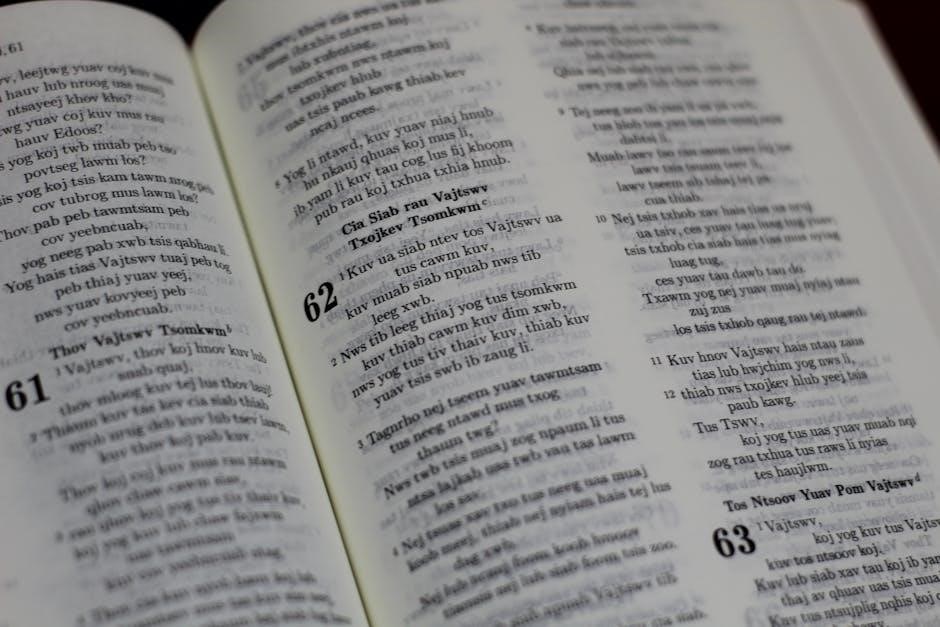Catholic Bible study is a transformative spiritual journey, deepening faith and understanding through Scripture. Essential tools like the St. Paul Center, Jeff Cavins, and Edward Sri’s studies provide accessible resources for all Catholics to explore God’s Word.
Overview of the Importance of Bible Study in Catholic Faith
Bible study holds a central role in the Catholic faith, serving as a foundation for spiritual growth and a deeper understanding of God’s divine plan. It fosters a personal relationship with Christ, illuminates the mysteries of the Church, and guides believers in living out their faith. The Scriptures are not merely historical texts but the living Word of God, offering timeless wisdom and guidance for daily life. Through Bible study, Catholics encounter the teachings of Jesus, the stories of salvation history, and the inspiration of the Holy Spirit. This practice also strengthens the unity of the Church, as it reflects the universal call to holiness and mission. The United States Conference of Catholic Bishops (USCCB) emphasizes that Bible study is essential for forming disciples and deepening one’s commitment to the faith.

Essential Principles of Catholic Bible Study
Catholic Bible study emphasizes the four senses of Scripture, prayerful reading, and the guidance of Church Tradition and the Magisterium to uncover God’s divine message.
The Four Senses of Scripture in Catholic Tradition
The Catholic Church teaches that Scripture can be understood through four senses: literal, allegorical, moral, and anagogical. The literal sense focuses on the historical and grammatical meaning of the text. The allegorical sense reveals how events prefigure Christ and His Church. The moral sense applies Scripture to personal virtue and spiritual growth. Finally, the anagogical sense looks to eternal realities and Heaven. This layered approach, rooted in Tradition, enriches Bible study, helping Catholics deepen their faith and encounter God’s divine plan.
The Role of Tradition and Magisterium in Interpretation
In Catholic Bible study, Tradition and the Magisterium play a vital role in ensuring authentic interpretation of Scripture. Tradition, as the living transmission of the Church’s teachings, provides the context for understanding biblical texts in harmony with the faith of the Apostles; The Magisterium, the teaching authority of the Church, guarantees that interpretations remain faithful to Christ’s message and the Church’s doctrine. Together, they guide believers to avoid misinterpretations and ensure that Scripture is read in continuity with the Church’s wisdom. This approach emphasizes the unity of faith and the importance of communal understanding, rooted in the Church’s authority and Tradition.

Must-Have Tools and Resources for Catholic Bible Study
Essential tools include Catholic study Bibles, online platforms like Verbum, and guides from the USCCB. These resources empower Catholics to explore Scripture deeply and faithfully, enriching their spiritual journey.
Recommended Catholic Bible Translations and Study Bibles
The Ignatius Catholic Study Bible and the Didache Bible are highly recommended for their comprehensive commentary and footnotes. The Great Adventure Bible offers a unique approach, helping readers understand the biblical narrative. These study Bibles incorporate Catholic traditions and teachings, making them ideal for deepening faith. They include annotations, historical context, and theological insights, ensuring a rich and informed study experience. Additionally, the RSV-CE (Revised Standard Version, Catholic Edition) is a popular translation known for its accuracy and readability, making it a favorite among Catholics. These resources are essential for both individual and group Bible study, providing a solid foundation for exploring Scripture.

Top Catholic Bible Study Programs and Guides
Jeff Cavins’ The Great Adventure is a renowned program offering a comprehensive, video-based approach to understanding the Bible. Edward Sri’s studies provide in-depth insights into Scripture, blending theology with everyday life. The St. Paul Center offers free online resources, including reflections on Sunday Mass readings. Fr. Mitch Pacwa’s Eucharist Bible Study Guide explores the sacrament through Scripture. Our Story presents the Bible’s big picture in 5-minute video segments, ideal for both group and individual use. These programs and guides are designed to deepen faith, offering structured paths for Catholics to engage with God’s Word effectively. They cater to all levels of familiarity with Scripture, ensuring a meaningful and enriching study experience.

Methods for Effective Catholic Bible Study

Methods for Effective Catholic Bible Study
Engage with structured programs like The Great Adventure and Our Story, which offer video-based learning and community interaction to deepen faith. Use Six Weeks with the Bible for concise, guided sessions that require no prior knowledge, fostering a deeper understanding of Scripture in a supportive environment.
Group Bible Study Approaches and Benefits
Group Bible study fosters community and deepens faith through shared insights and discussions. Programs like Jeff Cavins’ The Great Adventure and Our Story offer structured, video-based learning, ideal for parish or small groups. These resources provide a Catholic perspective, guiding participants through Scripture with clarity and depth. Group settings encourage accountability, prayer, and mutual support, creating a vibrant environment for spiritual growth. Additionally, materials like Six Weeks with the Bible and USCCB study guides are tailored for group use, requiring no prior knowledge and ensuring accessibility for all. Engaging in group Bible study strengthens faith, builds relationships, and enriches understanding of God’s Word within a supportive community.
Individual Bible Study Techniques and Practices
Individual Bible study offers a personal and intimate way to deepen faith and understanding. Techniques like Lectio Divina encourage slow, prayerful reading, reflection, and contemplation of Scripture. Using resources such as the Ignatius Catholic Study Bible or Verbum Bible software provides access to commentaries and study aids for deeper insight. Structured guides, such as those by Fr. Mitch Pacwa, offer theme-based approaches to explore topics like mercy or salvation. Setting aside dedicated time, creating a quiet space, and beginning with prayer fosters a meaningful experience. Individual study allows for flexibility, enabling Catholics to pace their learning and reflect on how Scripture applies to their lives, fostering a stronger personal relationship with God.

How to Begin a Catholic Bible Study Journey
Start with prayer, seeking God’s guidance. Choose a Catholic study Bible and foundational programs like The Great Adventure. Begin with the Gospels or Genesis, setting a consistent routine for reflection and growth.
Step-by-Step Guide for Newcomers to Bible Study
Begin with prayer, asking the Holy Spirit for guidance. Choose a Catholic study Bible, such as the Ignatius or Didache Bible, and explore foundational programs like The Great Adventure. Start with the Gospels or Genesis, setting a daily routine for reading and reflection. Use guides like Our Story or Six Weeks with the Bible for structured learning. Engage with online resources from the St. Paul Center or USCCB for additional insights. Join a parish group or use video series for community support. Remember, consistency and patience are key to deepening your faith and understanding of Scripture.
Choosing the Right Study Materials and Resources
Selecting the right materials is crucial for a fruitful Catholic Bible study journey. Opt for a trusted Catholic study Bible, such as the Ignatius or Didache Bible, which includes commentary and notes aligned with Church teachings. Utilize guides like The Great Adventure or Our Story for structured learning. For deeper insights, explore resources from the St. Paul Center, USCCB, or Verbum Bible software. Consider joining programs by Jeff Cavins or Edward Sri, known for their engaging and faith-deepening approaches. Ensure materials are approved by the Magisterium to maintain doctrinal accuracy. Choose resources that suit your learning style, whether individual study guides or group programs, to enhance your understanding and spiritual growth.



